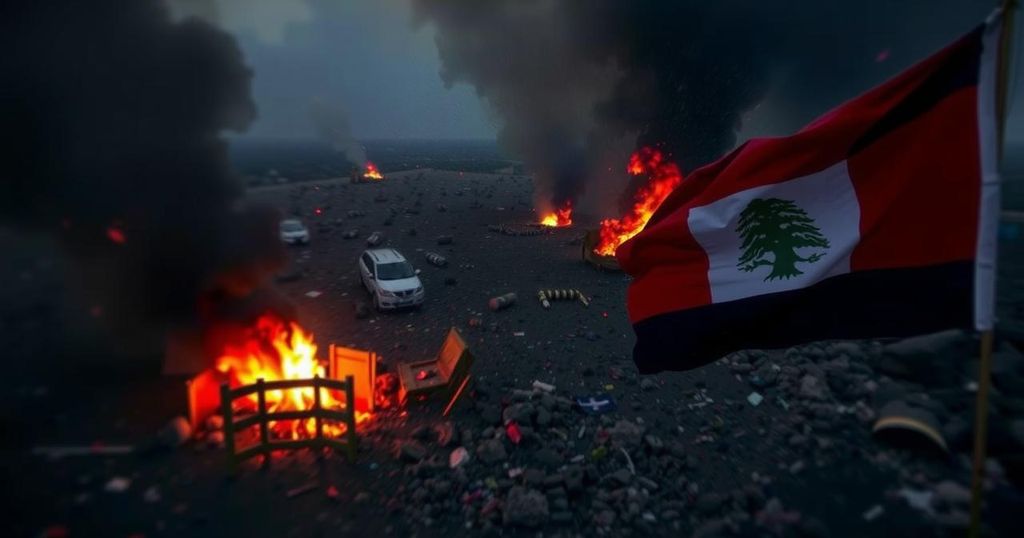Escalating Conflict in Gaza: A Year of Violence and Humanitarian Crisis
The Gaza conflict has reached its 379th day, with Israeli forces intensifying assaults in the Jabalia camp, causing significant civilian casualties. Despite calls for a ceasefire from international leaders, the conflict remains sharp with ongoing military engagements in both Gaza and Lebanon, resulting in escalating humanitarian crises.
The ongoing conflict in Gaza has extended into its 379th day, with Israeli military forces actively continuing aerial and ground assaults in the region, notably in the Jabalia refugee camp, where recent airstrikes have led to significant civilian casualties, including numerous women and children. The Israeli military’s operations in the northern Gaza Strip come amidst a sustained siege exceeding two weeks. Reports indicate that on a recent Friday, additional troops, specifically the Givati Brigade, were deployed to increase military pressures in Jabalia, raising concerns regarding potential escalations in violence. The Gaza Ministry of Health reported that over the previous 24 hours, three tragic incidents resulted in the deaths of 19 individuals and injuries to 91 others, contributing to a staggering death toll of 42,519 and over 99,637 injuries since the commencement of hostilities on October 7, 2023. Additionally, the ongoing disconnection of communication networks in northern Gaza has been interpreted by Hamas as a tactic to further isolate Palestinian civilians and obscure the actions taken by the Israeli military. Despite reportedly being besieged, many Palestinians remain resolute in their decision to stay within their homes in Jabalia, resisting Israeli evacuation orders. In the context of recent violence, the Islamic Resistance Movement (Hamas) confirmed the killing of its leader, Yahya Sinwar. International reactions have manifested with calls for a ceasefire coming from leaders including President Joe Biden and Chancellor Olaf Scholz after gatherings in Berlin, emphasizing the urgent need to halt warfare and facilitate humanitarian access for afflicted civilians. United Nations expert Michael Fakhri has also stated that the current Israeli operations amount to a “starvation campaign” in Gaza, despite the delivery of abundant humanitarian aid to the region since the onset of the conflict. On the ground, the Al-Quds Brigades of the Islamic Jihad have claimed responsibility for demolishing an Israeli military vehicle near the Tal al-Zaatar area, while the Qassam Brigades of Hamas targeted military equipment, reflecting persistent military engagements between parties involved. In Lebanon, the Israeli military reported the interception of drones originating from Lebanese territory, with escalating tensions accompanying Hezbollah’s missile strikes on Israeli sites, including the city of Safed. Concurrently, the Lebanese Prime Minister emphasized the pressing need for ceasefire and adherence to international resolutions amid ongoing Israeli incursions into southern Lebanon. This delineates a broader picture of regional instability, marked by diplomatic calls for peace alongside persistent military confrontations.
The Gaza conflict’s protracted nature has led to devastating humanitarian crises, characterized by widespread civilian casualties and escalating military actions by Israeli forces against Palestinian territories. The focus has shifted recently to Jabalia, a densely populated refugee camp, underscoring the severe impact of the conflict on innocent lives, with organizations like Hamas and Islamic Jihad engaging actively against Israeli military forces. Meanwhile, regional dynamics have been affected as Lebanon’s Hezbollah has increased military responses, representing a complicating factor in the broader Middle Eastern tensions that also involve international stakeholders advocating for peace.
The situation in Gaza and Lebanon illustrates a deeply entrenched conflict marked by significant loss of life and ongoing military operations. The calls from international leaders for an immediate ceasefire highlight the urgent need for humanitarian interventions to alleviate the suffering of civilians. Furthermore, the developments regarding military engagements between Lebanese and Israeli forces signify a troubling escalation that heightens regional anxiety and indicates complex international relations at play.
Original Source: www.dailynewsegypt.com




Post Comment